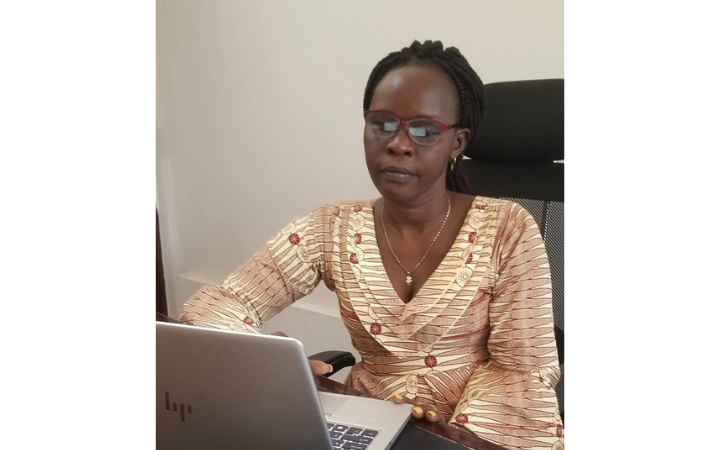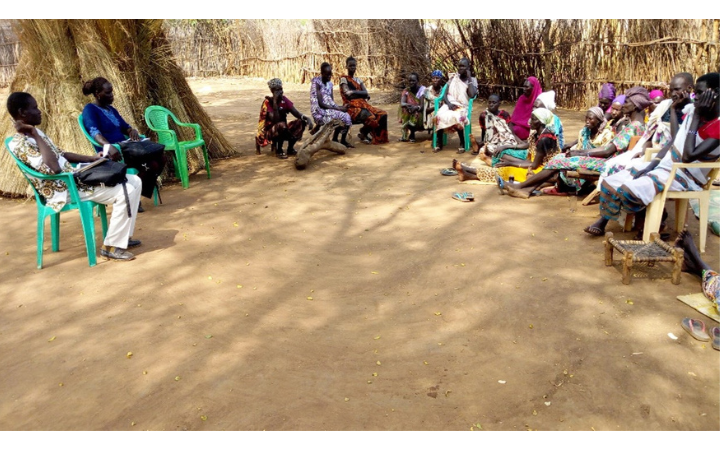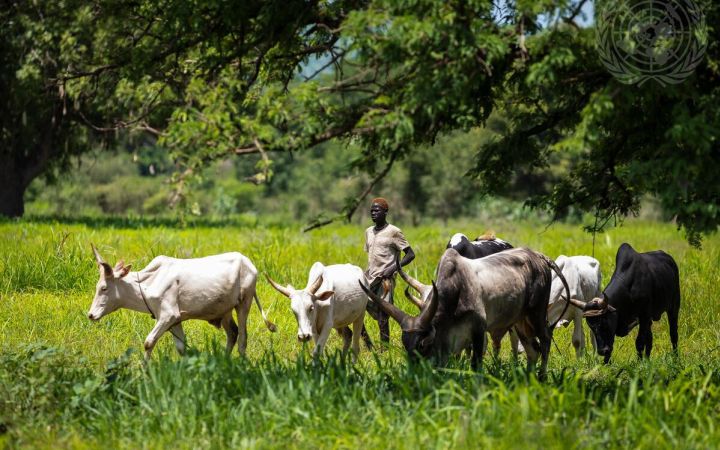- Chol Gatkek Tut is the Director General for Peace and Social Cohesion from the Ministry of Peacebuilding, South Sudan. She is dedicated to building peace in her country.
- She believes that, as the backbone of families, women are indispensable to peacebuilding in South Sudan.
- Chol uses entrepreneurship training to bring women together so they can learn about each other and help heal communities torn by years of conflict.
- Since 2015, UNITAR Division for Prosperity is training professionals in South Sudan in entrepreneurship and project planning.
June 2022, Hiroshima, Japan – In a country that has gone through multiple wars and conflicts in past decades, it is not easy to create consensus around peacebuilding, get buy-in from citizens and advance it, even drop by drop.
Chol Gatkek Tut, Acting Director General for Peace and Social Cohesion, Ministry of Peacebuilding of South Sudan, has been striving to bring people together since she was a teenager.
In a country where violence has begotten resentment, access to weapons and firearms is easy but basic security and food are depleted and development is hindered, the work is uphill. But Chol won’t be stopped.
It is useless to continue killing each other. Let us put down the guns, let us start life afresh. And then let us see how we can take this country not by war, not by fighting each other but by bringing our ideas together and do something that will help us.
The challenges in South Sudan
South Sudan is the newest country in the world, gaining independence in 2011 after years of war. Its short history as a nation is marked by conflict, which – according to a report by the London School of Hygiene and Tropical Medicine – has killed an estimated 400,000 people in five years of civil war. In 2022, some 8.9 million people need humanitarian assistance and protection.
However, a ceasefire in 2018 and the establishment of the current transitional government in 2020 renewed hope for peace and recovery. Chol’s ministry, the Ministry of Peacebuilding, was created to promote peacebuilding and enhance social cohesion. In this new system, Chol continues her life work of over 20 years in peacebuilding and humanitarian assistance and creating dialogue so communities can stop fighting.
Creating a space for women to rebuild
Chol has been working for peace since she was a teenager. Over the years, she has come to believe in creating spaces for women to strengthen their role in the community. “Women are the backbone of the family. Women are the mothers of the children who are fighting,” she says. And she knows women are doing what they can to make sure their children can sleep each night in peace.
Throughout the civil war, women were the victims of widespread gender-based violence and many had their livelihoods destroyed. Pulling women back from the front line of violence, Chol brings women of all backgrounds together to learn about entrepreneurship and each other.
When women work together, it becomes a powerful way to spread the message of peace, she believes.
Once they go back home, they will be able to share this message with their family and try to bring them together saying that, actually, these people are not our enemy, they are our friends [and] without them we cannot live in peace.
Resilience in the face of challenges
Chol’s ideas about entrepreneurship were reshaped in the 2020–2021 UNITAR Building Bridges: Entrepreneurship and Project Planning in South Sudan. The programme aimed to improve the capacity of South Sudanese professionals in entrepreneurship and project planning. Its goal was to help participants identify local needs and national priorities and create projects or businesses that will shape their nation’s recovery and development.
Using what she learned in the UNITAR training, Chol aims to teach women the business skills they need to produce and sell food products. Traditional sources of food in South Sudan include various cereal crops as well as animals like goats, cows and chickens. More women are also now getting into dried fish production because it’s inexpensive and the fish keep longer, which makes it easier to get to market.
There is still much uncertainty in South Sudan. Ongoing conflict, COVID-19, rising costs and devastating floods have forced many women to leave – some are internally displaced; others have fled nearby cities and countries. Violent cattle raids continue to plague parts of the country, depriving people of their livelihoods and sometimes their lives. Insecurity also prevents women from producing or selling their goods. Even a simple wish for a safe road to get to market is difficult to realize. How can a road be guaranteed as safe when there is no peace?
Years of conflict, raids, and sexual violence have also created a cycle of grudges and revenge that has left social cohesion in tatters.
But Chol believes entrepreneurship can contribute to peacebuilding.
I believe that activities that bring people together helps them to build peace among each other.
A vision for peace
To move forward. To live together. Chol bubbles with thousands of ideas. She wants to share what she knows with other women, and she feels she has more tools now to act on those ideas.
People have fought each other. But now that we have a new government, our main objective is how can [our people] be brought back together? They can have dialogues among each other. They can, again, live together.




